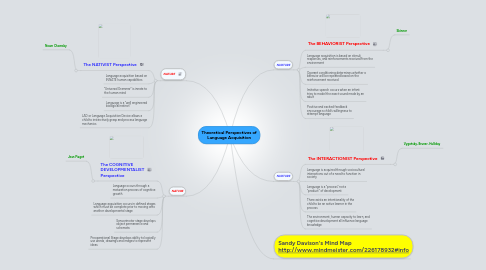Theoretical Perspectives of Language Acquisition
저자: Saundra Davison


1. NATURE
1.1. The NATIVIST Perspective
1.1.1. Noam Chomsky
1.2. Language acquisition based on INNATE human capabilities
1.3. "Universal Grammar" is innate to the human mind
1.4. Language is a "well engineered biological instinct"
1.5. LAD or Language Acquisition Device allows a child to instinctively grasp and process language mechanics
2. NATURE
2.1. The COGNITIVE DEVELOPMENTALIST Perspective
2.1.1. Jean Piaget
2.2. Language occurs through a maturation process of cognitive growth
2.3. Language acquisition occurs in defined stages which must be complete prior to moving onto another developmental stage
2.4. Sensorimotor stage develops object permanence and schemata
2.5. Preoperational Stage develops ability to logically use words, drawings and images to represent ideas
3. NURTURE
3.1. The BEHAVIORIST Perspective
3.1.1. Skinner
3.2. Language acquisition is based on stimuli, responses, and reinforcements received from the environment
3.3. Operant conditioning determines whether a behavior will be repeated based on the reinforcement received
3.4. Imitative speech occurs when an infant tries to model the exact sound made by an adult
3.5. Positive and excited feedback encourage a child's willingness to attempt language
4. NURTURE
4.1. The INTERACTIONIST Perspective
4.1.1. Vygotsky, Bruner, Halliday
